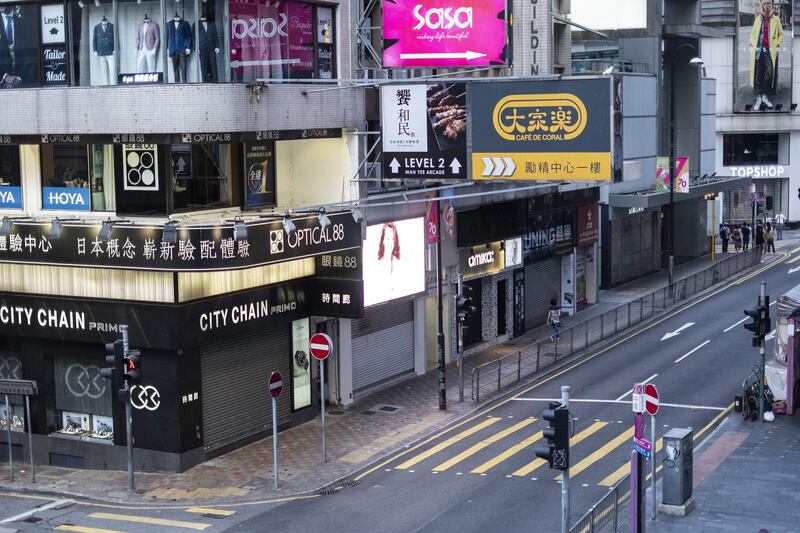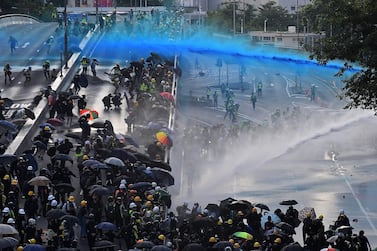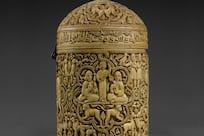The streets of Hong Kong echoed with an eerie calm on Saturday as metro services were suspended, shops closed, and a fraction of the usual thousands of pro-democracy protesters turned out on the streets against the city’s government.
The likely brief pause in months of at-times violent protests followed a night wracked with fire and vandalism triggered by the government’s decision to ban the wearing of face masks in public gatherings.
A major anti-mask ban march had been scheduled to take place on Saturday afternoon on Hong Kong Island. However, in an unprecedented move, the city’s metro authority MTR shut down its entire service on Friday night, citing “the outbreak of violence in multiple districts”. The service, which carries some four million passengers a day, remained closed throughout Saturday, causing a postponement of the march until Sunday.
Despite a few hundred mask-clad protesters taking to the streets to defy what they deem a draconian law enacted by the government, most residents remained at home, recharging and bracing for a planned three-million-person march tomorrow.
"This is not a rest day," one protester said in a text message exchange with The National. "Today we are simply staying at home and contributing to the explanation online as to why we vandalised those shops and MTR."
“There are no rioters, there is only tyranny,” he continued, ended his message with the slogan chanted by the protesters.
As most demonstrators chose to stay to home, Central, the city’s financial district, witnessed one of its quietest days. The area is usually packed with weekend mall-goers, but felt ghostly quiet on Saturday.
“I grew up in Hong Kong and let me tell you, I have never seen Central like this,” said Alvin Tse, a 22-year-old local resident, describing the largely empty streets and shops in the area.
Across Hong Kong Island, only a handful of businesses were open. A number of major malls were closed, including IFC at Central and SOGO at Causeway Bay - two of the biggest retail outlets of the city. Banks, especially those which have an affiliation with Beijing, also chose to close their branches in fear of another round of violent retaliation from the protesters.
Grocery stores followed suit. A statement from the 7-11 group of shops noted “security concerns,” as the reason it shops would be closed from 5 pm on Saturday. Local supermarket chain Wellcome also sent employees home at the same time.
“I can’t believe this - even level 10 typhoons didn’t make Wellcome close,” one local resident said while she was trying to buy some meat from the almost-empty shelves at a Wellcome store at 4:30 pm.
Friday night’s violence directly contributed to Saturday’s citywide paralysis. In a televised speech this afternoon, the embattled Chief Executive Carrie Lam said she was “appalled” by Friday’s violence committed by the protesters and said that the level of violence “justified the invocation of the Emergency Regulations Ordinance.”
“I hope all sides will understand the government’s decision,” she said, imploring her constituents to stand behind the government’s move.
Hong Kong's protests were ignited by a now-scrapped plan to allow extraditions to the mainland, which fuelled fears of an erosion of liberties promised under "one country, two systems".
After Beijing and local leaders took a hard line, the demonstrations snowballed into a wider movement calling for more democratic freedoms and police accountability.
Lam has refused any major concessions but struggled to come up with any political solution that might end the chaos leaving police and demonstrators to fight increasingly violent battles as the city tips into recession.






